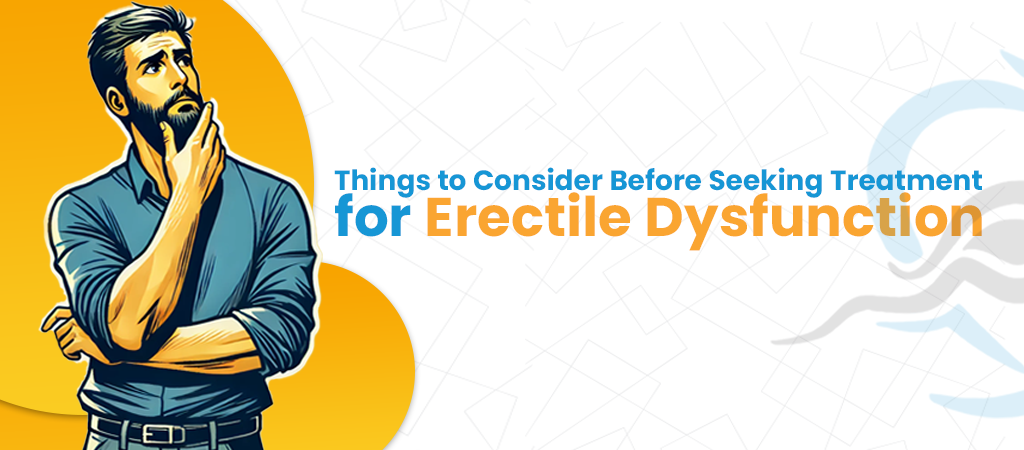Things to Consider Before Seeking Treatment for Erectile Dysfunction
Getting Started on the Path to ED Treatment
Understanding your options and getting ready for the trip ahead are the first steps in seeking therapy for erectile dysfunction (ED). This book will guide you through important factors such as medicine, alternative therapies, lifestyle changes, surgical procedures, the importance of relationships and mental health, and more.
Knowing About Erectile Dysfunction
A guy with erectile dysfunction (ED) finds it difficult to get or keep an erection. Numerous physical and psychological factors contribute to it, such as:
Physical Factors
Obesity, diabetes, heart disease, hormone imbalances, and unhealthy lifestyle choices.
Psychological Factors
Relationship issues, stress, or anxiety.
It’s normal to occasionally have trouble getting an erection, so there’s no reason to worry. On the other hand, it could be necessary to see a specialist and begin treatment if these issues continue for months.
Changes in Lifestyle’s Role
One of the most important initial steps in controlling ED is changing one’s lifestyle. Poor cardiovascular health and physical activity are major contributors to ED cases.
Diet and Exercise
Both general and sexual health can be enhanced by a balanced diet and regular exercise, such as a 40-minute brisk walk.
Stress Management and Mindfulness
Practices like yoga and meditation not only lower stress levels but also enhance sexual function and sleep quality.
Changing to better behaviors can have a profound impact, particularly when paired with stress-reduction techniques.
The Relationship Between Psychology and Personal Relationships and Mental Health
Since ED and mental health are frequently connected, a holistic approach to treatment is necessary.
Therapy and Counseling
Performance anxiety and relationship stress can be addressed with cutting-edge techniques like Cognitive Behavioral Therapy (CBT) and mindfulness-based therapies.
Partner Involvement
Open conversation with your partner and relationship counseling can create a healing environment.
Treating psychological issues in addition to physical ones is crucial because mental health is a key component of ED treatment.
Options for Erectile Dysfunction Treatment
1. Drugs
For ED, doctors frequently prescribe medications, particularly PDE5 inhibitors. But new research points to other options, such as tailored drug schedules for people who don’t react to conventional therapies.
2. Alternative Medicine
- Shockwave Therapy: Low-intensity shockwaves are used to increase blood flow to the penis.
- Penis Pumps: Mechanical devices that generate an erection by drawing blood into the penis.
3. Surgical Procedures
Surgery is a last-resort option but has become more effective with advancements like minimally invasive procedures. Penile implants are now more accessible and can be customized based on patient needs.
4. New Therapies
Innovative approaches like stem cell therapy, gene therapy, and platelet-rich plasma therapy are showing promising results in delivering more permanent solutions.
The Partner’s Role
ED impacts both the individual and the relationship. Involving your partner in the treatment process can strengthen the relationship and create a supportive environment.
Communication
Open discussions about feelings, expectations, and treatment plans are essential.
Patience and Realism
Progress takes time, and setting realistic expectations helps both partners stay committed to the process.
A partner’s involvement can foster emotional intimacy and expedite recovery.
Other Important Factors
Individual Responses
Every person’s body reacts differently to treatments, so flexibility and patience are key.
Ongoing Process
ED treatment is not a one-time fix. Regular follow-ups with your sexologist ensure you stay on track and adjust treatments as needed.
The Bottom Line
Addressing ED involves a holistic and personalized approach, combining lifestyle changes, mental health support, medical options, and partner involvement. This journey requires patience, open communication, and the guidance of a sexologist to achieve the best outcomes.
By taking these steps, you can navigate ED treatment confidently and work toward restoring sexual health and overall well-being.

